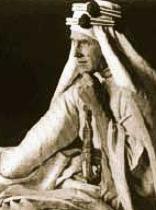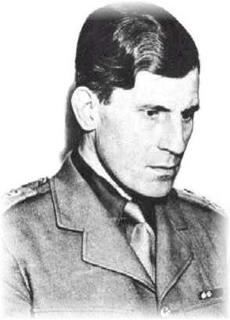This is coolbert: The British Army has always seemed to produce it's share of officers that can best be characterized as eccentric, odd types. Men who do not follow the exact rules and protocols of British society or the British Army. These men are recognized by their brother officers as being "odd" types, but are usually tolerated. Some of these eccentrics have become quite successful and well known. Men that possess an active imagination, are innovative and inspire their subordinates.
Of course the case of T.E. Lawrence [Lawrence of Arabia] stands out in the mind of many persons.

A scholar, a soldier, a diplomat, a man of many eccentricities. Lawrence, in his early years, while still at University, became the foremost expert in the world on Crusader castles in the Middle East. His military career was distinguished in World War One, and he did have an aborted diplomatic career. This he gave up and served later both in the Royal Flying Corps and the Tank Corps as an enlisted man to get enough military service to qualify for a pension. His post war military career as an enlisted man was done despite the urging of Churchill, who considered Lawrence to be one of the seven most important men alive. Churchill repeatedly urged Lawrence to accept and serve in high position, which Lawrence declined, rather serving as an enlisted man [while as an enlisted man, he got extra income from translating some of the classics from Greek to English!!!].
Another eccentric British officer, less well known than Lawrence, was Orde Wingate.

During the late 1930's, Captain Orde Wingate, while stationed in British Mandated Palestine, organized Jewish fighters into Jewish Night Squads. Combat patrols that did night missions in an effort to help the British combat an on-going Arab uprising taking place at the time. These "Night Squads" would set up ambushes, conduct raids, etc. Wingate felt he was divinely ordained to train and lead these night squads, he being a Biblical scholar and obvious eccentric and "odd" type. Wingate is mentioned in the Leon Uris novel "Exodus" as Major P.P. Malcolm as having a special affinity for the Jews and their aspirations. For no apparent reason other than he felt he was as I have said, divinely ordained to do what he was doing. Wingate was the inspiration for an entire generation of young officers of what was to become the Jewish Haganah and eventually the Israeli Army. Tactics and methods used by Wingate became adopted as the fighting style of the Israeli Army, i.e., night fighting, offensive action, surprise and daring.
The story of Orde Wingate does end with the fighting in British Palestine. During World War Two, Wingate came to the attention of Churchill by "distinguishing himself in the Abyssinian [Ethiopian] campaign". Further subsequent command of the Chindits [Chinese bandits] in Burma followed. As a Brigadier General, Wingate organized, trained and led missions of large columns of British troops into Japanese controlled territory. These "Chindits" pursued an unconventional war behind Japanese lines that was very successful, albeit with great losses to themselves. Mining railways, blowing bridges, ambushing and raiding Japanese units. The entire tenor of these missions changed the whole direction of the war in Burma. Prior to the missions of the Chindits, the Japanese had held the upper hand easily in the very rough jungle fighting. After the Chindits, the balance was with the British. Wingate met an unfortunate end, being killed in a glider crash. Wingate was sorely missed by the British Army in Burma. To read a most interesting web site about Wingate, click here.
Eccentric officers such as Lawrence and Wingate are often credited with having too active an imagination. Well, they may have one hundred ideas, ninety of which are goofy and impractical. Well, that leaves them ten good ideas ahead of what most everyone else comes up with. Such persons are often of great value, despite odd eccentricities.
coolbert.

0 Comments:
Post a Comment
Subscribe to Post Comments [Atom]
<< Home